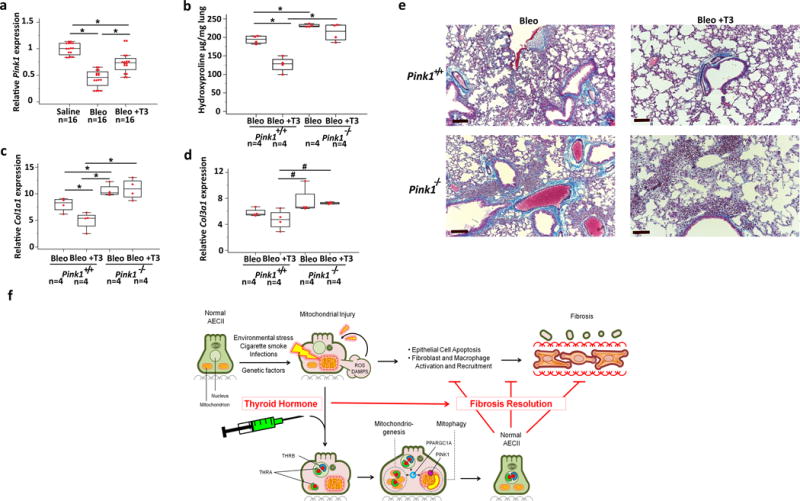Figure 6.

PINK1 is required for the antifibrotic effects of TH. (a) Quantitative RT-PCR analysis for Pink1 mRNA levels in wild-type littermates intratracheally challenged with saline, bleomycin or aerosolized T3 following bleomycin. (means+ SEM), *P < 0.001. (b) Collagen deposition assessed by hydroxyproline content in Pink1-deficient (Pink1−/−) mice or wild-type littermates (Pink1+/+) treated with aerosolized T3 following intratracheal challenge with bleomycin vs. controls. Data presented are from one of two independent experiments with similar results and are expressed as mean hydroxyproline content per lung set (μg/gr lung) + SEM, n = 4 mice/group, *P < 0.001. (c,d) Quantitative RT-PCR analysis of collagen type 1, alpha 1 (Col1a1) and type 3, alpha 1 (Col3a1) mRNA levels in a similar group of mice indicated in b (means+ SEM), *P < 0.001 and #P = 0.03. (e) Masson’s Trichrome staining of representative lung sections (n = 3) from each group of treated mice indicated. Scale bars, 100μm. The statistical test used was one-way ANOVA with Student-Newman-Keuls post-hoc test for pairwise comparisons (a) (F=46, df=47), (b) (F=29.9, df=15), (c) (F=12.9, df=15), (d) (F=4.2, df=15) (f) Schematic diagram of a model of the anti-fibrotic effect of TH via its restoration of mitochondrial homeostasis and function in alveolar type II epithelial cells (AECIIs). Injury of AECIIs leads to mitochondrial dysfunction and release of reactive oxygen species (ROS) and damage-associated molecular patterns (DAMPs) including mitochondrial DNA. TH supplementation modifies fibrosis through an epithelial protective effect via its binding to its receptor (THRA1, THRB) and its promotion of the expression of positive regulators of mitochondrial metabolism (PPARGC1A) and mitophagy (PINK1), resulting in restoration of normal mitochondrial function, rescue from mitochondria-regulated apoptosis and fibrosis resolution.
